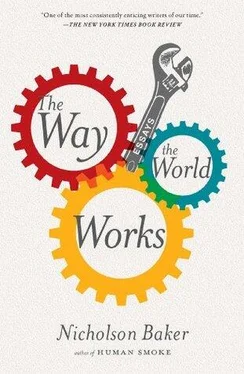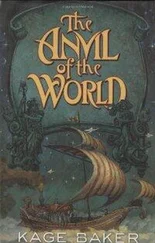Nicholson Baker - The Way the World Works
Здесь есть возможность читать онлайн «Nicholson Baker - The Way the World Works» весь текст электронной книги совершенно бесплатно (целиком полную версию без сокращений). В некоторых случаях можно слушать аудио, скачать через торрент в формате fb2 и присутствует краткое содержание. Год выпуска: 2012, Издательство: Simon & Schuster, Жанр: Публицистика, Критика, на английском языке. Описание произведения, (предисловие) а так же отзывы посетителей доступны на портале библиотеки ЛибКат.
- Название:The Way the World Works
- Автор:
- Издательство:Simon & Schuster
- Жанр:
- Год:2012
- ISBN:нет данных
- Рейтинг книги:4 / 5. Голосов: 1
-
Избранное:Добавить в избранное
- Отзывы:
-
Ваша оценка:
- 80
- 1
- 2
- 3
- 4
- 5
The Way the World Works: краткое содержание, описание и аннотация
Предлагаем к чтению аннотацию, описание, краткое содержание или предисловие (зависит от того, что написал сам автор книги «The Way the World Works»). Если вы не нашли необходимую информацию о книге — напишите в комментариях, мы постараемся отыскать её.
), here assembles his best short pieces from the last fifteen years.
The Way the World Works
OED
Modern Warfare 2
Through all these pieces, many written for
, and
, Baker shines the light of an inexpugnable curiosity.
is a keen-minded, generous-spirited compendium by a modern American master.
The Way the World Works — читать онлайн бесплатно полную книгу (весь текст) целиком
Ниже представлен текст книги, разбитый по страницам. Система сохранения места последней прочитанной страницы, позволяет с удобством читать онлайн бесплатно книгу «The Way the World Works», без необходимости каждый раз заново искать на чём Вы остановились. Поставьте закладку, и сможете в любой момент перейти на страницу, на которой закончили чтение.
Интервал:
Закладка:
Even so, God of War III has visual astonishments in almost every scene. You walk around on Gaia’s gigantic rocky body. You see her giant stony breast. You climb into her chest cavity and see her stony heart beating. You cut her wrist so that she falls away. The game, to a surprising degree, is about hacking away at half-naked women, or naked half-women. Whenever you see female breasts, you have a pretty good idea that the breasted person is going to die horribly, and soon. God of War III is a confused confection, and the brilliant, smiley, jokey designers who made it should hang their claws in shame for so misdirecting their obvious talents.
The last big game I played was a Western called Red Dead Redemption, made by Rockstar, the people who created Grand Theft Auto . I bought it on its release day, May 19, 2010. You are John Marston, a polite whoreson cowboy with virtuous instincts who has done bad things in the past. John is handy with a lasso and he has dirty hair, as does everyone in the game. He collects medicinal herbs like feverfew, he keeps cows from panicking in a storm and running off a cliff, he shoots and skins skunks, wolves, bears, raccoons, vultures, and coyotes—“Ugh, what were you eating?” he mutters to the dead coyote as blood splatters on the screen — and he travels the dry borderlands of Texas and Mexico helping or hurting innocent people: your choice. When he loots a bounty hunter’s corpse, he says, “This ain’t nice, I know.” A kind woman named Bonnie tries to draw him out, but he’s not chatty. “You are being deliberately obscure as a substitute for having a personality,” Bonnie says, as she and John canter around her ranch on horseback.
You kill and you die in Red Dead Redemption, of course — with “dead eye” aiming, you can queue up several shots in slow motion, while on horseback — and when you die the word “dead” appears on the screen in fat red cracked letters. But after an exhausting day of shooting and skinning and looting and dying comes the real greatness of this game: you stand outside, off the trail, near Hanging Rock, utterly alone, in the cool, insect-chirping enormity of the scrublands, feeling remorse for your many crimes, with a gigantic predawn moon silvering the cacti and a bounty of several hundred dollars on your head. A map says there’s treasure to be found nearby, and that will happen in time, but the best treasure of all is early sunrise. Red Dead Redemption has some of the finest dawns and dusks in all of moving pictures. Albert Bierstadt couldn’t make morning light look this good. When you do eventually wander back into town, a prostitute pipes up, “I can’t stand to see a man walking around town with such a dry pecker. Can I help?”
So those were the games I tried. They showed me many sights I’m glad I’ve seen, and some I wish I hadn’t seen. I liked Uncharted 2 best, but Red Dead Redemption had the prettiest clouds and hootiest owls, and the taciturn Modern Warfare 2 had the deepest moral snowdrifts. My son has been trying out Crackdown 2, where you leap around a city shooting mutant freaks and collecting energy from green orbs. But he’s playing less now; he’s waiting for September’s release of Halo: Reach, which will let players construct intricately ramped battle structures that hang out over rocky coastlines. I think it’s time for me to take a break. No war, no gods, no bounties, no kill chains, no vengeance. No convoys in Afghanistan. Just end it. Maybe I’ll try a game like Flower, for the PlayStation 3, which is a sort of motocross game for wind and petals. Or even go outside, with my pants legs tucked into my socks so that the midsummer ticks don’t crawl up my legs. I miss grass.
(2010)
Last Essay
Mowing
Sometimes everything seems simple. This morning, a Saturday in July, I reached down to the books beside my bed and pulled up a Dover collection of old Robert Benchley columns. I looked at the copyright page and I saw the dates—1930, 1931. The dates meant something to me. I knew people who had lived through those dates. I knew who Robert Benchley was, and I knew what Dover Books was. I came downstairs and tried to pour a cup of coffee. The coffeepot was empty, but as soon as I determined that it was empty I knew that my wife had very kindly transferred the coffee into the red thermos so that it would stay hot. And indeed there it was, in the red thermos. My wife was out walking the dog. It was nine-thirty. It had been nine-thirty on many Saturday mornings before this. All the sounds I heard were familiar: the tires swooshing intermittently by, and the birds — the nearby rapid chirpers and the distant screechers — and the single cricket just getting revved up for the day. I understood the kitchen tablecloth perfectly — a white cotton tablecloth with faded blue and yellow stripes. It had dried outside on the drying rack that we stuck into a flagpole socket in the yard.
I felt I understood the New York Times on the tablecloth as well, why it was there, and when I walked out through the dining room into the front hall and paused in front of a bookcase there, I looked at all the titles. Every title in the bookcase meant something to me. Most of the books I had packed and unpacked several times. I already had a place in my head that held each book. Each was one I wanted in my life in this unobtrusive way, on the shelf in the front hall where nobody would pay much attention to it. The door was open and the cool air from outside pushed gently through the screen and reached me. I was barefoot. Never had I known quite this particularity of peace.
So I thought again, Sometimes everything seems simple. Today I’m going to mow part of the lawn. I enjoy mowing the lawn — I know this lawn well, and I sing mildly obscene songs while I mow and think about the way grass looks. My son will mow part of the lawn. I will pay him for the part he mows. I understand how money works, green dollar bills — they’re in my wallet. My daughter will sunbathe on the mown lawn near the asparagus plant, reading a book. What book is she reading? Nabokov’s Pnin . How comprehensible is that! I have read Nabokov’s Pnin, more than once. My wife wrote a paper on Pnin in college for a Russian literature class. She and I have talked about Pnin many times. Everything around me is anchored somehow or other in a familiar past.
Pnin is a scholar, “ideally bald.” He is a figure of fun. What’s the point of scholarship? Why do I sometimes, indeed often, want to be surrounded by lots of things I don’t understand? Why do I want to travel to some historical society and ask to see a dead man’s papers and work slowly through them, learning hundreds of new names? Is it because I want to be responsible for a piece of life that nobody else is responsible for? Is it because I want some heretofore unchronicled episode in deep time to become almost as familiar to me as the surroundings in my own life, so that I can walk around the bonsai arrangement that I have resurrected out of letters and guest lists and memos, and be as unsurprised by any part of it as I am unsurprised by my own red thermos bottle and bookcase? I don’t really know why I’m drawn to do scholarship of this old-fashioned sort. I know I like finding things out — I like rationed chaos. I feel sorry for newspaper reporters who have only a day or two to research a story. Each story deserves five years. Not ten — ten years and the story goes stale. But five.
Finding things out: there is an infinitude of things you don’t know, but it’s not a very interesting infinitude, because it has no grain. Only some of the unknown things, a much smaller subset, are things that you are aware of not knowing, and then within that subset is a smaller set still — the unknowns that pull at you. Curiosity is a way of ordering and indeed paring down the wildness of the world. Of all the unmown fields, all the subjects I don’t know anything about, this one right here is the one I would like to pursue. Why? Because nobody else is, and because it happens to be here and it draws me. I will contribute most efficiently to the whole if I pursue this topic, knowing that it is obscure enough that nobody would be foolish enough to duplicate my efforts. I will mow my own lawn, part of it, anyway.
Читать дальшеИнтервал:
Закладка:
Похожие книги на «The Way the World Works»
Представляем Вашему вниманию похожие книги на «The Way the World Works» списком для выбора. Мы отобрали схожую по названию и смыслу литературу в надежде предоставить читателям больше вариантов отыскать новые, интересные, ещё непрочитанные произведения.
Обсуждение, отзывы о книге «The Way the World Works» и просто собственные мнения читателей. Оставьте ваши комментарии, напишите, что Вы думаете о произведении, его смысле или главных героях. Укажите что конкретно понравилось, а что нет, и почему Вы так считаете.












